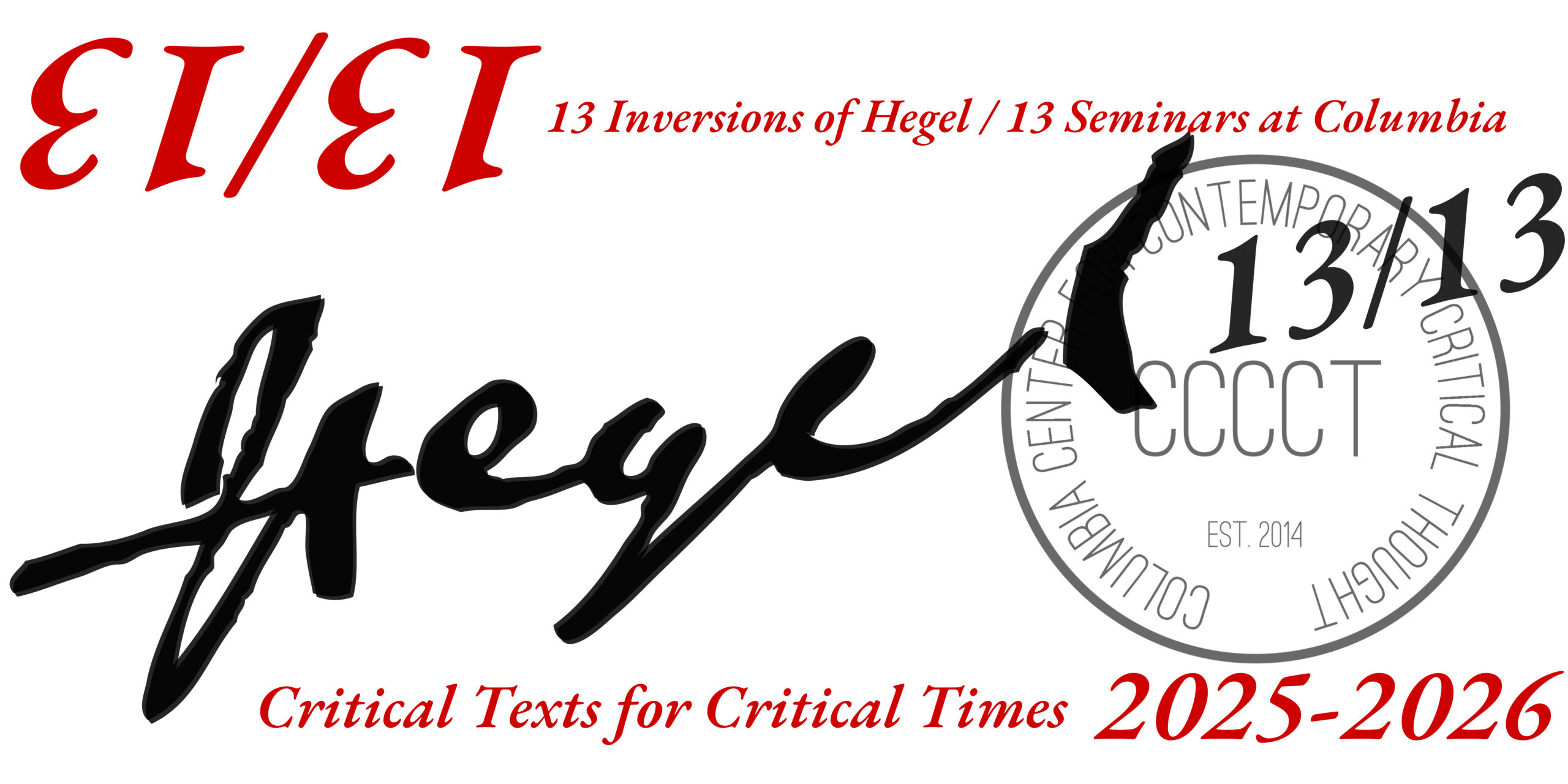Simone de Beauvoir and The Second Sex (1949)
Readings:
Simone de Beauvoir, Le Deuxième sexe (Paris: Gallimard, 1949)
Simone de Beauvoir, La Force de l’âge (Paris, Gallimard, 1960)
Simone de Beauvoir, Journal de guerre. Septembre 1939-janvier 1941 (Paris, Gallimard, 1990)
Resources :
Kimberly Hutchings, « Beauvoir and Hegel », p. 187-197, in Laura Hengehold and Nancy Bauer, eds. A Companion to Simone de Beauvoir (Hoboken, NJ: John Wiley & Sons, 2017).
Jean-Baptiste Vuillerod, « Le maître et la vassale. Hegel, Beauvoir en miroir », Simone de Beauvoir Studies 34 (2023) 100–120.
Marie-Andrée Charbonneau, « Le Deuxième Sexe et la philosophie: Maître, esclave, ou …? Le Cas Simone De Beauvoir », Simone de Beauvoir Studies, 2000-2001, Vol. 17, Beauvoir in the New Millennium (2000-2001), pp. 7-19
Susan F. Buck-Morss, Hegel, Haiti, and Universal History (Pittsburgh: University of Pittsburgh Press, 2009)
Alain Badiou, « Maîtres et esclaves chez Hegel », Sud/Nord 2016/2 n° 27, pages 35 à 47, Éditions érès.
* * *
Jean-Paul Sartre, Frantz Fanon, and Simone de Beauvoir
Readings:
Resources :
Brandon Hogan, “Frantz Fanon’s Engagement With Hegel’s Master-Slave Dialectic,” Africology: The Journal of Pan African Studies, Volume 11, no. 8 (2018): 16-32.
James Schmidt, “Lordship and Bondage in Merleau-Ponty and Sartre,” Political Theory 7, no. 2 (1979): 201–27.
* * *
Alexandre Kojève and the “End of History”
Alexandre Kojève’s lectures on Hegel’s Phenomenology of Spirit—with their unique emphasis on the master-slave dialectic—shaped the course of post-war French philosophy. They also had a strong influence on conservative American thought, with Kojève’s student, Allan Bloom, editing and introducing Kojève’s work to an American audience, and Francis Fukuyama drawing on Kojève’s idea of the “end of history” after the fall of the Iron Curtain. Kojève’s lectures had deep repercussions on the work of Jean-Paul Sartre and Frantz Fanon (as we will see in the segments on their writings) and continue today to influence our political debates, as evidenced by the provocative thesis of Susan Buck-Morss in her essay and then book, Hegel, Haiti, and Universal History. In this segment, we start with Kojève to explore contemporary debates.
Core Readings
G.W.F. Hegel, Hegel’s Lectures on the History of Philosophy, trans. E.S. Haldane and Frances H. Simson, in three volumes (London: Routledge and Kegan Paul, 1892)
G.W.F. Hegel, Introduction: Reason in History. Introduction to the Lectures on the Philosophy of World (1822-1828 and 1830-1831 versions), trans. H.B. Nisbet (Cambridge: Cambridge University Press, 1975)
Alexandre Kojève, Introduction à la lecture de Hegel. Leçons sur La Phénoménologie de l’esprit, ed. Raymond Queneau (Paris : Gallimard, 1947)
Alexandre Kojève, Introduction to the Reading of Hegel: Lectures on the Phenomenology of Spirit, ed. Allan Bloom, trans. James H. Nichols, Jr. (New York: Basic Books, 1969).
Susan F. Buck-Morss, Hegel, Haiti, and Universal History (Pittsburgh: University of Pittsburgh Press, 2009); Susan Buck-Morss, “Hegel and Haiti,” Critical Inquiry 26, no. 4 (Summer, 2000): 821-865.
Additional Readings
Jeff Love, “Alexandre Kojève and Philosophical Stalinism.” Studies in East European Thought 70, no. 4 (2018): 263–71. https://www.jstor.org/stable/48700921
Samantha R. Hill, “The scar of identity,” Aeon, March 21, 2023. Available at https://aeon.co/essays/the-philosophical-legacy-of-alexandre-kojeve
Isabel Jacobs, “Introduction to Alexandre Kojève’s ‘Moscow, August 1957’,” Studies in East European Thought 76 (2024): 117–122. https://link.springer.com/article/10.1007/s11212-023-09572-8
* * *
We are also planning another seminar on Jean-Paul Sartre:
Jean-Paul Sartre drew on Hegel and Heidegger to develop his existential philosophy in the 1940s, and Hegel and Marx to reconcile his existentialism with Marxism in the 1950s and 60s. Throughout, he confronted Hegel’s master-slave dialectic, returning to it repeatedly to deal with colonialism, the war in Algeria, and his own critical praxis. In this segment, we turn to Sartre’s engagement with Hegel’s writings.
Core Readings
Jean-Paul Sartre, Being and Nothingness: A Phenomenological Essay on Ontology, trans. Hazel E. Barnes (New York: Washington Square Press, 1992 [1943]), Part III, chs. 1 and 3.
Jean-Paul Sartre, Critique of Dialectical Reason, trans. Alan Sheridan-Smith and Quintin Hoare, 2 vols. (London: Verso, 2004–2006 [1960]).
Jean-Paul Sartre, Notebooks for an Ethics, trans. David Pellauer (Chicago: University of Chicago Press, 1992 [1983]).
Jean-Paul Sartre, “Black Orpheus,” in What is Literature? and Other Essays, trans. John MacCombie, ed. and intro. Steven Ungar (Cambridge, MA: Harvard University Press, 1988), p. 289–330.
Jean-Paul Sartre, “Matérialisme et Révolution I. Le mythe révolutionnaire,” Les Temps modernes, 1re année, no. 9 (June 1946): 1537–1563; “Matérialisme et Révolution II (et fin). La philosophie de la révolution,” Les Temps modernes, 1re année, no. 10 (July 1946): 1–32. Available in English https://brotherwisedispatch.blogspot.com/2018/09/materialism-and-revolution-by-jean-paul.html
Additional Readings
J.A. Podhorodecki, “Self-Certainty and Nothingness: Differences of Situation in Hegel & Sartre,” Philosophia 49, 1671–1679 (2021). https://doi.org/10.1007/s11406-020-00313-3
James Schmidt, “Lordship and Bondage in Merleau-Ponty and Sartre,” Political Theory 7, no. 2 (1979): 201–27. http://www.jstor.org/stable/191178.
Storm Heter, “Authenticity and Others: Sartre’s Ethics of Recognition,” Sartre Studies International 12, no. 2 (2006): 17–43. http://www.jstor.org/stable/23511000.
Jennifer Ang Mei Sze, “Whither Hegelian Dialectics in Sartrean Violence?” Sartre Studies International 15, no. 1 (2009): 1–23. http://www.jstor.org/stable/23511193.
